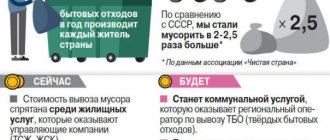Home / Real estate
Back
Published: 03/12/2020
Reading time: 10 min
0
1500
The privatization process allows housing to be transferred from state ownership to private ownership. The peak of real estate privatization occurred in the 90s, but remains available today. In 2021, this procedure remains available to Russians who live in housing provided to them under a social tenancy agreement. What are the pros and cons of real estate privatization and is it worth converting the apartment into your own property? Is it possible to deprivatize the apartment in the future?
- What is apartment privatization and why is it needed?
- Which properties does it apply to?
- Who has the right to privatize an apartment
- Dates
- Advantages and disadvantages
- The procedure for privatizing an apartment in 2021 Documents
- Definition of method
- Obtaining consent from other owners
- Step-by-step algorithm
- Cost of the procedure
- Invalidation of privatization
When will the privatization of housing stock in the Russian Federation be completed?
Initially, several years were allotted for privatization. Since 1991, the Government of the Russian Federation has provided Russians with the opportunity to re-register state-owned housing as personal property. But the grace period, when you can complete all stages for free, has already been extended several times. At the moment, the rule is that all citizens can undergo the procedure before the end of 2021. And until 2020 - Crimeans and residents of dilapidated real estate. The category of orphans has the right to privatize living space before the expiration of the social tenancy agreement for the housing in which the child lives.
At the current stage, Russians have managed to privatize 30 million housing units, which is 80% of the housing stock. Moreover, according to Government estimates, such a high indicator is not found almost anywhere in the world. Since the procedure cannot last indefinitely, a decision was made to set a final deadline. But news often appears in the media that privatization after a year may become permanent. At the moment there is no confirmation of such information. Therefore, no one knows what will happen next, whether it will be paid or free.
Not every living space can become personal. It is prohibited to transfer into private property:
- real estate that has been awarded museum status;
- office premises;
- living space in emergency buildings;
- real estate in protected areas;
- apartments and houses in closed military zones and facilities;
- dormitories.
Housing becomes a property free of charge, regardless of its market, cadastral or any other value. However, there will still be certain costs.
So a certificate that confirms the fact that a citizen has not previously participated in privatization procedures costs 300-500 rubles. Registration of a registration certificate for real estate - 1,500 rubles. To register the transfer of ownership, you will need to pay a state fee of 2,000 rubles. An extract from the Unified State Register will cost 200 rubles. You may have to pay for other certificates or photocopies of documents. On average, 4-4.5 thousand rubles are spent on the procedure.
Duration of the program
Initially, the privatization law was supposed to be in force for only a few years. However, the authorities decided to continue the bill for residents of Crimea after its union with the Russian Federation. Moreover, at first it was planned to extend the program only for those citizens who live in dilapidated houses, but then the bill was slightly modified.
Today, unfortunately, there is no exact data on whether the privatization of housing will be extended after March 1, 2021. It can be assumed that the law will be extended, at least against the backdrop of the fact that during quarantine people cannot privatize property, because isolation creates some restrictions. True, it is quite problematic to confirm this information at the moment.
Related news:
- Which countries require a visa for citizens of Kazakhstan in...
- How to get maternity benefits in Kazakhstan in 2021?
- Population of Belarus for 2021
- News on pension payments in 2021 in Belarus
- What are the holidays in October 2021 in Kazakhstan?
- Planting potatoes according to the lunar calendar for 2022
This is interesting! In 2020, the President of the Russian Federation proposed to completely abolish temporary limits for free privatization of housing stock. The fact is that non-privatized apartments are a kind of ballast that is on the state budget. All expenses that appear and are required to maintain the house, as well as unpaid taxes, are a minus for the budget. According to preliminary estimates, privatized property brings about 6 billion rubles to the state budget annually, or even more. From this point of view, lifting temporary restrictions on free manipulations for the privatization of apartments is beneficial both for the population of the country and for the state.
It must be said that people who live in dilapidated houses risk sooner or later being left without any housing, because it will simply be demolished. Registration of property rights will make it possible to apply for new housing, that is, it gives the right to social guarantees from the government.
Participants of the procedure
Participants in the real estate privatization program can become:
- All residents who live under a social tenancy agreement in apartments or houses owned by the state or municipality. From which it follows that even minor children from infancy have the right to become full participants in the program.
- Children under 14 years of age. But in this case, their interests are represented by their parents, adoptive parents or legal guardians.
- Teenagers from 14 to 18 years old. Such residents have the right to represent their interests and write a statement on their own, but are required to notify the parent, adoptive parent or guardian.
- Citizens over 18 years of age go through all stages of privatization independently. However, they must remember that if one housing has already been transferred into their ownership free of charge, then when the second property is privatized they will have to pay. But if a child took part in the procedure as a shareholder before reaching 18 years of age, he retains the right to one free privatization of state or municipal housing.
- If a citizen was absent for objective reasons at the time of privatization of shared housing, for example, he served in the army, he has the right to receive his share when he returns.
Advantages and disadvantages
The main advantage of privatization is the ability to register ownership of real estate for free and dispose of it at your own discretion. Thus, apartment owners have the right :
- Transfer the apartment by inheritance. A privatized apartment can be inherited and included in a will. In order to enter into an inheritance, the heirs will not need to prove the presence of family ties with the testator and the fact of living together with him in the same apartment. As for a non-privatized apartment, it is not inherited. But this does not mean that the relatives of the responsible tenant will be evicted from the apartment: they will continue to live in the apartment, and one of the relatives can re-register the social tenancy agreement for themselves. Only those relatives who were registered in it on the date of death of the tenant will be able to live in the apartment. A non-privatized apartment can be inherited if the citizen has collected all the documents, submitted an application for privatization and died before the execution of the contract. If none of the tenants lived in the apartment at the time of the tenant’s death, then it will pass to the state (based on Part 5 of Article 83 of the Housing Code). That is why it is so important that one of the residents is registered in the apartment.
- Register new tenants in the apartment. You can register anyone in the apartment at the discretion of the owners. In a non-privatized apartment, the consent of other family members must be obtained to register spouses, parents, and adult children. To register other citizens, consent can be obtained from residents and the municipality. The municipality will check compliance with the accounting standard for area per person: for example, in Krasnodar it is 10 square meters. m, in St. Petersburg – 9 sq. m, etc. The only exception is minor children: they can be registered without any additional permissions.
- Sell, donate, pledge or exchange, rent. A non-privatized apartment cannot be disposed of at your own discretion, and its transfer for rent may become a formal reason for refusing to renew the social tenancy agreement.
- Remodel the apartment and transfer it to non-residential premises. Thus, the owner has the right to carry out redevelopment at the moment when he himself wishes. In relation to municipal housing, you must first obtain consent from the actual owner (state or municipality). And transferring an apartment to non-residential premises is virtually impossible.
Privatization of an apartment will reduce the monthly payment for the use of residential premises. This compensation is paid by residents of social apartments monthly in the form of an addition to the rent (the amount of such payment in Moscow is about 1,100 rubles per month). Although you have to pay tax for an apartment you own, its amount is much less than the amount of compensation for using social housing.
There are also disadvantages of real estate privatization , including:
- Maintenance costs are borne by property owners. If the owner does not pay for them himself, then he can be forced to pay for them in court (based on Article 210 of the Civil Code or Article 158 of the Housing Code). Tenants of apartments under social tenancy agreements do not have to incur additional expenses: all expenses are borne by the owner, represented by the municipality.
- A privately owned apartment can be subject to foreclosure, but municipal housing cannot (under Article 32, 87.2 of the Housing Code). A non-privatized apartment cannot be seized as part of enforcement proceedings or during the bankruptcy process, since it does not actually belong to the person.
- If a social facility is planned to be built on the site of the house, the privatized apartment may be seized from the owner. The authorities compensate for the seizure of real estate in different ways: they can provide other real estate in return or pay monetary compensation. Of course, in this situation the non-privatized apartment will also be confiscated, but the exchange will be more profitable taking into account the standard of living space per person.
- The need to pay property taxes annually (according to Article 400 of the Tax Code).
- The need to pay fees for major repairs of an apartment building. Based on Part 1 of Art. 154 of the Housing Code, we can conclude that apartment tenants do not pay such fees, but owners are obliged to do so.
- Deprivation of the right to free privatization in the future.
Documentation for re-registration of living space
The transfer of real estate into ownership is based on the personal initiative of a Russian, his family and a package of documents. Papers should be prepared in advance so that the entire procedure goes through as quickly as possible and without repeated requests. The list includes:
- certificate in Form 3 from the management company about all registered residents;
- technical passport for real estate;
- written statements from all residents of the premises who are over 14 years old, indicating that they agree with the privatization, must sign the papers in their own hand;
- certificates of previous registrations, which indicate that this citizen has not privatized other property;
- extract from the unified state register of real estate;
- identification documents of the applicant himself and his family members - passports, birth certificates;
- certificate of marriage or divorce;
- receipts for payment of utility bills confirming the absence of debts for the previous quarter;
- state duty payment receipt.
This list can be adjusted at the request of government officials who carry out the privatization procedure.
If a citizen deliberately provides false information that he has never gone through the privatization procedure before, and the fact is revealed, he will be refused and punished. Documents that raise doubts are returned to the applicant for revision or re-registration. When preparing certificates, it is important to take into account their validity period, so that by the end of the collection of documents and at the time of submission, all are valid.
When incapacitated or minor citizens are involved in a transaction, the documents are checked with special care. If the fact of false refusals of shares is revealed, the procedure is considered void.
If illegal alterations or reconstructions were carried out in the privatization object, then they will have to be eliminated and only after that the documents must be collected.
What does privatization give?
Owned housing allows its owner to fully dispose of it. He can perform any actions with real estate:
- rent out an apartment and receive income from it;
- draw up a will;
- pledge an apartment;
- draw up a deed of gift;
- sell real estate.
Refusal to participate in privatization
A process of deprivatization is possible, which consists of the transition of private property to state property. It is needed in order to protect single citizens from attacks on their living space. When completing this procedure, the consent of all registered citizens is also required. Deprivatization is being formalized on a voluntary basis. At the request of the tenant, the apartment is included in municipal or state ownership ( Article 9.1 of Federal Law No. 1541-1 of 04/07/1991 ).
Law of the Russian Federation dated July 4, 1991 N 1541-1 (as amended on December 20, 2017) “On the privatization of housing stock in the Russian Federation.” Article 9.1
Action steps
After collecting all the certificates and documents, the following steps await when transferring housing into personal ownership:
- Contact the office of the multifunctional center with all papers and an application or submit an application through the State Services portal. You can make an appointment at the MFC and clarify the list of documents remotely. This will help reduce time and effort. In exchange for the package, the applicant will be given a receipt with a list of papers submitted for consideration.
- The inspector will check the package and set a date for the meeting of the privatization commission.
- Wait for the commission's decision. It can be accepted for a maximum of 2 months from the date of submission of documents.
- If the result is positive, receive a document for the transfer of ownership.
- Issue a certificate of ownership of property in Rosreestr.
- Re-register with the BTI service.
After this, the citizen and his family become the owners of the living space. If family members refuse the share, then the applicant will be the sole owner, if not, then everyone will have a share.
Those relatives who renounced their share in the property do not become owners, but they retain the right to lifelong residence in the territory of this living space. The consent of children under 14 years of age is not required; they automatically become participants in privatization.
Russians can reduce their waiting time. To do this, you will need to pay for an urgent procedure. The cost can be determined by a realtor who will take care of all stages of preparation and collection of documents.
How does privatization happen?
The step-by-step process of privatization is described in the article:
- Collection of documents required for registration. The most time-consuming process.
- Drawing up an application. You can obtain its form from the MFC or Rosreestr.
- Submitting documents for consideration to the Unified State Register of Enterprises, where they undergo legal review. The review period should not exceed 2 months ( Article 8 of Federal Law No. 1541-1 dated 04/07/1991 ). Law of the Russian Federation dated July 4, 1991 N 1541-1 (as amended on December 20, 2017) “On the privatization of housing stock in the Russian Federation.” Article 8
- Signing the contract. At this stage, the presence of all participants in the privatization or the mandatory presence of a power of attorney executed by a notary is required. The privatization agreement does not require notarization and no state duty is charged for its execution ( Article 7 of Federal Law No. 1541-1 dated 04/07/1991 ). Law of the Russian Federation dated July 4, 1991 N 1541-1 (as amended on December 20, 2017) “On the privatization of housing stock in the Russian Federation.” Article 7
- Obtaining a certificate. You will need to pay 2000 rubles as a state fee. The document will be ready within 10-14 days.
Example of an application for privatization
Housing privatization process
Why privatize an apartment
Housing is privatized to achieve two goals:
- It is allowed to conduct purchase and sale transactions with personal real estate. It can also be bequeathed, donated, mortgaged, rented or exchanged.
- You can transfer your own apartment or house from a private housing stock to a commercial one.
After privatization, citizens have additional expenses:
- property tax, while there is no such fee for state or municipal housing;
- services related to the repair and development of adjacent territories and repair work are higher for private owners than for residents of state property.
But the majority of Russians do not consider these expenses significant compared to the benefits that the owner receives.
Legislation
The procedure for transferring living space into ownership is regulated by:
- Housing Code.
- Federal Law “On Privatization...” (1991, July 4, No. 1541-1)
- Amendments to the said law. They were adopted by the legislator each time before the end of the next term. The latter was put into effect on February 28, 2021 by federal law number 19.
- Regulatory acts of self-government bodies.
Until what year is the transfer of real estate into personal ownership extended and until what time is it allowed to submit documents?
Find out about the procedure for deprivatizing an apartment from our article.
Why can they refuse?
Some Russians are faced with refusal to carry out privatization. This is possible in the following situations:
- the documents provided contain false information or are compiled incorrectly;
- real estate cannot be privatized in accordance with the law;
- the housing was subject to redevelopment or reconstruction that was not legalized;
- the applicant does not have permanent registration in the privatization object or he only rents living space;
- the citizen is already the owner of some other home and tried to hide this fact.
The applicant from the MFC will receive a reasoned refusal to carry out the procedure for transfer of ownership. The reason will be clear from it. If it is not legal, then the citizen can go to court and challenge it.
about the author
Klavdiya Treskova - higher education with qualification “Economist”, with specializations “Economics and Management” and “Computer Technologies” at PSU. She worked in a bank in positions from operator to acting. Head of the Department for servicing private and corporate clients. Every year she successfully passed certifications, education and training in banking services. Total work experience in the bank is more than 15 years. [email protected]
Is this article useful? Not really
Help us find out how much this article helped you. If something is missing or the information is not accurate, please report it below in the comments or write to us by email
Reasons
The main basis for carrying out the free privatization procedure should be the desire of the owners who are registered in this municipal housing. It is important to note that each of the owners must agree to this procedure, otherwise he will have to provide a written refusal.
Part of the real estate cannot be privatized either. These types are provided for by the law of the Russian Federation.
What real estate cannot be privatized?
- apartments and houses that are in disrepair;
- dorm rooms;
- apartments that were issued for service. As a rule, these are apartments in a closed military town.
What are the grounds for privatizing land for a private house?
- citizens use this land plot legally and the erected house is a completely legal building;
- citizens use a land plot and erected a housing building on it, which was not registered as ownership before the Land Code of the Russian Federation came into force in 2001.
Comments: 0
Your comment (question) If you have questions about this article, you can tell us. Our team consists of only experienced experts and specialists with specialized education. We will try to help you in this topic:
Author of the article: Klavdiya Treskova
Consultant, author Popovich Anna
Financial author Olga Pikhotskaya
Reasons for extending the period
The strategy of the members of the State Duma is aimed at obtaining a 100% positive result from making this decision. In other words: “You give privatization to every apartment!”
The new amendments are aimed at reducing the level of anxiety among the population and the fear of not having time to complete the necessary documents before the specified deadline. People who have at least once encountered real estate issues will confirm that such matters move extremely slowly, taking a lot of effort and time.
If there are still time restrictions, then in a hurry you can make a mess by turning to the “ministers” of the real estate market for help, who, for a certain fee, will settle all the formalities and resolve the issue positively in the shortest possible time. However, the result is not always exactly what the customer originally expected. We are talking about corruption and the active activities of black realtors. Unlimited terms of privatization will reduce risks of this kind.
Paid or free: what's the difference?
The free privatization right can be used once. However, payment of state fees and ongoing costs for collecting the necessary documents cannot be avoided . When registering privatization, it is necessary to document that this right has not been used previously. This is stipulated by law (RF Law No. 1541-1). Subsequent privatization procedures are paid, their number is not limited.
Reference! Extracts should a priori be issued free of charge. But in some cases, municipal employees determine paid rules and introduce price lists for document preparation services.
Obtaining a title document for the privatization of an object is a process determined by many factors. Therefore, in each case an individual action plan is developed. The cost is determined by the number and complexity of the activities carried out.
It is possible to use your free right to privatize an apartment for a fee by contacting intermediaries. The cost of transaction support is from 10,000 rubles.











